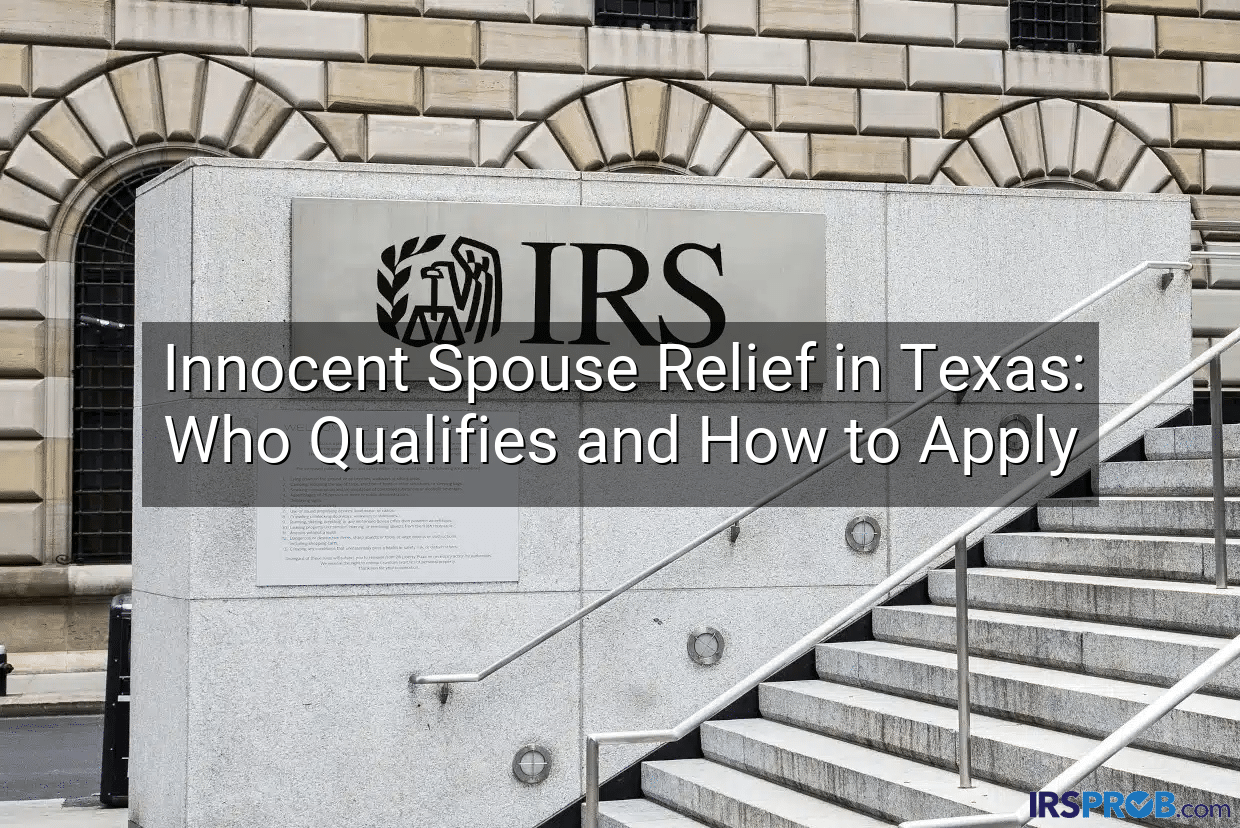Innocent Spouse Relief in Texas: An Overview
In recent years, innocent spouse relief has emerged as a lifeline for individuals who find themselves entangled in tax liabilities resulting from their spouse’s or ex-spouse’s errors. In Texas, where community property and unique state tax issues create additional layers of complexity, understanding innocent spouse relief is essential for ensuring proper protection under the law.
Innocent spouse relief is a provision that allows an individual to be relieved from joint tax liabilities when it can be proven that they did not know, or had no reason to know, about the understatement of tax or tax fraud conducted by their partner. This public service is particularly relevant to Texas residents, as the state’s community property laws can complicate the allocation of responsibilities in a joint filing situation.
This article provides a comprehensive approach to understanding innocent spouse relief in Texas. It includes an explanation of the qualifying criteria, a detailed step-by-step guide on how to apply, potential challenges along the way, and valuable insights to help you strengthen your case. Additionally, readers will discover real-life examples and learn how to leverage the expertise of IRS Prob for additional support.
Understanding the Foundations of Innocent Spouse Relief
The concept of innocent spouse relief was established to provide fair relief when one spouse or partner is unfairly saddled with a tax debt due to errors committed by the other party. Initially introduced as a way to prevent unjust financial penalties, innocent spouse relief now plays a vital role in reassessing liability in joint returns.
The regulatory framework for innocent spouse relief involves several key conditions, such as proving a lack of knowledge regarding the understatement of tax, and, in some instances, demonstrating that it would be unfair to hold the innocent party responsible. The Internal Revenue Service (IRS) evaluates each case on its merits, considering factors like the timing of the discovery, the extent of involvement in the financial affairs, and the overall fairness of enforcing the joint liability.
This section digs deeper into the legal foundations of innocent spouse relief. It also examines how these legal principles are adapted to safeguard taxpayers in different scenarios, from simple errors to deliberate misconduct. Understanding these fundamentals is crucial for anyone considering or advising on a relief application, particularly in Texas where state-specific laws add dimensions to the case.
Texas-Specific Considerations for Innocent Spouse Relief
Texas taxpayers face unique challenges when navigating innocent spouse relief, primarily due to community property laws that can blur the lines between individual and joint responsibilities. Under these laws, most property acquired during the marriage is considered jointly owned, which can complicate the assessment of who is responsible for tax liabilities.
Moreover, Texas has a history of a strong stance against what it considers undue financial hardship for individuals caught in joint liabilities. This state-specific approach means that innocent spouse relief applications must be closely aligned with both federal guidelines and state regulations. Applicants must present evidence that separates their individual financial responsibilities from those incurred by their spouse.
For Texas residents, it is essential to gather comprehensive financial documentation that highlights separate income streams, bank accounts, and other financial assets, thereby making a clear case that the tax misrepresentation was isolated to the other party. By doing so, applicants can better demonstrate their limited involvement in, or knowledge of, the spouse’s tax issues.
Furthermore, Texas taxpayers should be aware of local IRS offices and legal experts specializing in innocent spouse relief. These professionals understand the intricacies of Texas law and can provide valuable guidance during the application process.
Who Qualifies for Innocent Spouse Relief in Texas?
Eligibility for innocent spouse relief in Texas is determined by several critical factors designed to identify those who truly did not contribute to or benefit from the errors that led to the tax liability. To be eligible, an applicant must meet specific criteria that prove their non-involvement and demonstrate that holding them accountable would result in significant financial hardship.
Federal criteria for innocent spouse relief generally include that the application must be filed within a specified time frame of the tax return filing, the taxpayer must prove lack of knowledge regarding the understatement or erroneous reporting of tax, and that the taxpayer did not receive any direct benefit from the understatement. In Texas, these criteria are reinforced through an evaluation of the community property implications.
In many cases, the qualifying conditions can be summarized as follows:
- Not being aware of the erroneous tax reporting
- Demonstration of financial hardship if held liable
- Evidence of separate financial decision-making and management
- Timely filing of Form 8857, Request for Innocent Spouse Relief
These conditions ensure that innocent spouse relief texas qualification is not granted arbitrarily but rather through a robust review process. Documentation plays a key role in meeting the qualification, and taxpayers are encouraged to maintain meticulous records that clearly delineate individual assets and liabilities.
Legal precedents have underscored that even minor contributions to a tax filing can complicate an innocent spouse relief claim. Therefore, applicants must thoroughly prepare their case by gathering all relevant financial statements, tax returns, and legal documents that indicate their lack of participation in the misreporting.
Step-by-Step Guide to Applying for Innocent Spouse Relief in Texas
Applying for innocent spouse relief in Texas requires a careful and methodical approach. The process begins with a thorough review of your tax records and an honest appraisal of your financial and tax filing history. Once you determine that you may qualify, following a step-by-step process will increase your chances of success.
The first step involves gathering all necessary documentation. This includes tax returns, proof of separate income, bank statements, and any legal documents that underscore the separation of finances. Once your documentation is assembled, it is time to complete Form 8857, Request for Innocent Spouse Relief. This form asks for detailed information about your financial situation, the circumstances that led to the tax liability, and a declaration of your non-involvement in the tax understatement.
After submitting Form 8857, the IRS undertakes an investigation into the circumstances of your case. During this period, maintain regular contact with the IRS and be prepared to provide additional documentation or clarification if requested. It’s vital to keep copies of all correspondence and filings related to your case.
In Texas, applicants should be aware that local nuances may affect expectations during the review process. For instance, interviews or additional local assessments might be conducted to better understand the separation of financial responsibilities in the context of community property. It’s also advisable to consult with a tax professional who has experience with innocent spouse relief in Texas, as they can offer strategic advice and help navigate any complications that arise during the review process.
Understanding the timeline is also critical. Generally, the IRS takes several months to process a request for innocent spouse relief, but this period can be extended if additional information is required. Patience, thoroughness, and responsiveness to IRS inquiries are all essential components of a successful application.
Common Challenges and How to Overcome Them
Even with a well-prepared application, many Texas taxpayers encounter challenges in securing innocent spouse relief. Understanding these common hurdles and implementing strategies to overcome them is imperative for increasing your chance of success.
One frequent challenge is proving that you had no knowledge of the erroneous tax reporting. The IRS scrutinizes the nature of your financial relationship with your spouse, and any evidence of joint decision-making can complicate your claim. To counter this, it is essential to compile thorough documentation that distinctly separates your financial activities from those of your spouse. This might include exclusive bank statements, credit reports, and any documentation that records financial decisions made independently.
Another hurdle is the strict timelines associated with filing for relief. Missing deadlines or having incomplete documentation can result in automatic disqualification. Taxpayers are advised to begin the process as soon as discrepancies are discovered and to remain vigilant about meeting all IRS requirements. Consulting a tax professional can help ensure that all necessary steps are completed punctually.
In Texas, the interpretation of community property laws further complicates matters. When property and assets are jointly owned, the IRS may assume shared responsibility for any discrepancies. In such cases, legal experts with experience in Texas community property issues can be invaluable in crafting a strong case. Additionally, be prepared for possible requests for supplemental evidence that further detail the division of responsibilities.
It is also not uncommon for applicants to feel overwhelmed by the complexity of the IRS’s procedures. Educational seminars, one-on-one consultations with IRS Prob experts, and utilizing online resources provided by state tax agencies can offer clarity and streamline the process.
Additional Resources and Assistance for Texas Taxpayers
Navigating the intricacies of innocent spouse relief texas qualification is a challenging endeavor, but there are numerous resources available to help Texas taxpayers. Government websites, local IRS offices, and professional financial advisors all offer valuable information and support to ensure you are well-prepared.
IRS Prob, in particular, stands as a trusted resource for those facing complex tax scenarios. With a focus on providing personalized assistance, IRS Prob’s experts are adept at explaining the finer points of innocent spouse relief, tailoring advice specifically for Texas residents. They can help you interpret state-specific regulations, prepare the necessary documentation, and guide you through the filing process.
Beyond direct assistance, taxpayer advocacy groups and community legal centers offer free or low-cost consultations. These organizations are equipped to address common legal challenges related to tax liabilities and can help you understand your rights when dealing with the IRS. Additionally, many state-based websites and publications provide updated information on procedural changes, deadlines, and other essential details relevant to innocent spouse relief.
Educational workshops and webinars focusing on tax resolution strategies are another excellent resource. These sessions often cover topics such as record-keeping best practices, effective communication with IRS representatives, and case studies of successful innocent spouse relief applications. Participating in these programs can not only enhance your knowledge but also connect you with professionals who can provide additional insights and recommendations.
Case Studies and Real-Life Examples
Examining real-life examples of innocent spouse relief cases can be incredibly insightful, especially for Texas taxpayers facing similar challenges. In this section, we explore several case studies that illustrate how individuals navigated the complicated relationship between federal tax law and Texas community property principles.
One case involved a Texas resident who, after a divorce, discovered that errors in the spouse’s tax filings had resulted in a significant tax debt. By meticulously documenting accounts that were solely in their name and gathering evidence that demonstrated limited financial engagement in the erroneous tax decisions, the applicant was able to secure innocent spouse relief. This case underscores the importance of separating personal financial activity from that of a spouse, particularly in a community property state.
Another case study featured a taxpayer who initially struggled to meet the IRS documentation requirements due to shared financial records. After obtaining independent financial advice and reorganizing their records to clearly reflect personal versus marital income, the taxpayer successfully appealed the initial denial. The process involved multiple communications with the IRS, during which expert testimony and detailed bank records played a decisive role in overturning the preliminary findings.
A third example highlights the challenges of timing. In this situation, an applicant missed the initial window for filing and had to negotiate a late submission by providing compelling evidence of continuous ignorance about the tax understatement until discovery. The taxpayer’s persistence and proactive communication with the IRS eventually led to a favorable outcome, demonstrating that while timelines are strict, there may be room for exceptions in well-documented cases.
These case studies reveal that a personalized approach—tailored to the nuances of individual financial circumstances and Texas law—is often key to success. They also reinforce the importance of early intervention, detailed record-keeping, and professional guidance when pursuing innocent spouse relief.
Frequently Asked Questions About Innocent Spouse Relief Texas Qualification
Pro Tips from IRS Prob
Pro Tip #1: Organize Your Financial Records Early
Begin by compiling separate financial documentation, including bank statements, credits, and income records. In cases involving innocent spouse relief texas qualification, a well-organized record is invaluable in demonstrating financial independence. Early organization can pinpoint discrepancies and establish a clear narrative around your financial responsibilities, which in turn strengthens your case significantly during IRS reviews.
Pro Tip #2: Seek Professional Tax Guidance
When navigating the complexities of innocent spouse relief, especially in Texas, professional advice is indispensable. An experienced tax advisor can help interpret both federal guidelines and the nuances of Texas community property law. They will guide you in compiling the necessary documents, filling out forms accurately, and tailoring your case to highlight your non-involvement and the fairness of granting relief.
Pro Tip #3: Maintain Timely and Clear Communication with the IRS
Timeliness and clarity are critical when dealing with IRS inquiries. Keep detailed records of all communications, submissions, and follow-ups. Promptly responding to any additional information requests and consistently clarifying any uncertainties in your application will help you maintain a strong rapport with IRS representatives, thereby increasing the likelihood of a favorable decision.
Conclusion
The journey toward obtaining innocent spouse relief in Texas is demanding, yet it can be immensely rewarding when executed with careful preparation and expert support. This comprehensive guide has illuminated the essential aspects of this process—from understanding the legal foundations and state-specific nuances to gathering pivotal documentation and overcoming common challenges.
Texas taxpayers facing the burdens of joint tax liabilities can benefit from the strategic insights shared here. With meticulous record-keeping, professional guidance, and proactive communication with the IRS, it is possible to dismantle the unfair financial responsibilities imposed by a spouse’s tax mistakes. Whether you’re just beginning to explore innocent spouse relief or are in the midst of a challenging case, remember that a tailored approach grounded in Texas-specific regulations is key to safeguarding your financial future.
Ultimately, innocent spouse relief is about restoring fairness and ensuring that those who were unknowingly burdened can reclaim their financial stability. By learning from real-life examples, taking advantage of the available resources, and following the step-by-step guidance provided, you can confidently navigate this complex process. Stay informed, remain diligent, and don’t hesitate to leverage expert advice to support your journey toward resolution.









